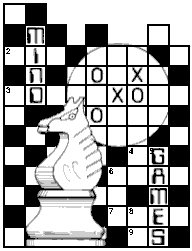| mind games |

Philip Joy looks at an adventure game
FOLLOWING my comments about adventure games in the last issue I have received a game called Cheops Tomb. It is available from Algor and the company claims it is probably the best adventure game on the market.
While allowing for the natural over-enthusiasm of the producer, I found that it was one of the best adventure games I have seen for the ZX-81. It is interesting and well-presented with excellent screen display and has an addictive quality about it.
The instructions are unusually well done and very clear but the game is complicated.
The idea is to try to find your way out of the tomb, which consists of a 16 by 5 maze of rooms. The maze includes treasures, weapons, gods, monsters, passageways and locked doors, for which keys must be found.
The player might be called on to fight a monster with varying amounts of strength. You are also able to cast spells of varying degree of effect, from sleep to death. The goal is to try to find the great key to let you out of the tomb.
The animals and gods will do their best to stop you in any way possible. Gods can appear from nowhere and kill you, without warning; that can ruin the game, as you have no chance to fight. One other point is that you have to enter the whole command, which can be as much as 20 words; therefore some abbreviations should be included. The game is well-priced at £7.
Now for a review of a flight simulator sent by David Cordiner of Birmingham. Pilot is a real-time aircraft simulator written entirely in Basic for the 16K ZX-81. The most obvious disadvantage of such a program is its speed. As a result of this the information displayed on the screen is updated only every few seconds. It gives the impression that the aircraft is not always responding to your inputs.
The program, however, contains some exceptional points, one of which is the aircraft attitude which can make the difference between a crash and a safe landing. The controls include up, down, left and right, with power, flaps and a good display of the instruments. The game has some humour, if you can call it that, when the flaps fall off at high speed.
The author says that the main reason for writing the program in Basic was so that the program could be studied and altered in places. It could therefore be used as a tool for learning about Basic. Pilot is priced at £3 which, compared to some other games, is very reasonable.
I have also received two versions of chess for the 48K Spectrum. The first game is from Prism Computing. It is, of course, in machine code, with six levels of play, from beginners to postal chess.
It can save a game on cassette and print out a copy of the board for later reference. Prism says that the loudspeaker of the Spectrum is used in the game - that is, of course, if you can hear it.
The second game is from Artic Computing. The cover and cassette say that it is for the Spectrum but the loading instructions are for the ZX-81. Obviously that is an oversight, but it sounds very funny when a Spectrum game tells you to set up your ZX-81. The game has seven levels of play, with response times from two seconds to several minutes. You can analyse games by setting-up your own positions. The program can also recommend a move.
Now for the answer to last month's problem about adding all the prime numbers less the 5,000. There are 699 numbers, with the last one 4,999 and the sum being 1,548,135.